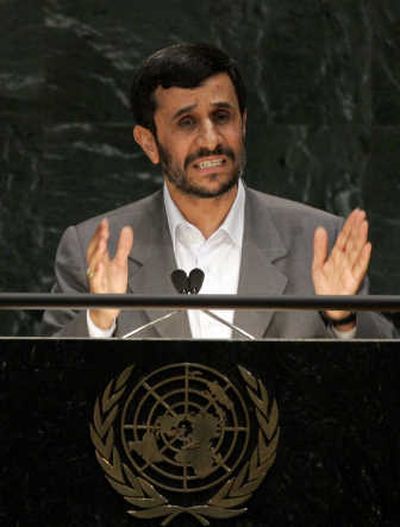Iran leader: N-program closed issue

UNITED NATIONS – Iranian leader Mahmoud Ahmadinejad declared Tuesday that Iran’s disputed nuclear program is closed as a political issue and said Tehran will ignore a U.N. Security Council demand imposed by “arrogant powers” to curb its nuclear program.
Instead, he told world leaders at the U.N. General Assembly that Iran has decided to pursue the monitoring of its nuclear program “through its appropriate legal path,” the International Atomic Energy Agency, which is the U.N. nuclear watchdog agency.
When Ahmadinejad was ushered to the podium, the U.S. delegation walked out, leaving only a low-ranking note-taker to listen to his speech, which indirectly accused the United States and Israel of major human rights violations. State Department spokesman Gonzalo Gallegos said the U.S. wanted “to send him a powerful message.”
The Iranian president spoke shortly before German Chancellor Angela Merkel warned the diplomats of “disastrous consequences” for Israel and the world if Iran acquires a nuclear bomb. “The world does not have to prove to Iran that Iran is building a nuclear bomb. Iran has to convince the world that it is not striving towards such a bomb.”
Hours earlier, French President Nicolas Sarkozy told the assembly that allowing Iran to arm itself with nuclear weapons would be an unacceptable risk.
“There will not be peace in the world if the international community falters in the face of the proliferation of nuclear arms,” Sarkozy said. The Iranian crisis “will only be resolved if firmness and dialogue go hand-in-hand.”
Iran insists the program is purely peaceful, aimed solely at using nuclear reactors to generate electricity.
But the United States and key European nations believe the program is a cover for an Iranian attempt to produce nuclear weapons.
Ahmadinejad has defied two Security Council resolutions demanding Iran suspend enrichment and imposing escalating sanctions on key figures and organizations involved in the nuclear program. He made clear in his speech that Iran did not intend to comply with them now.
“In the last two years, abusing the Security Council, the arrogant powers have repeatedly accused Iran and even made military threats and imposed illegal sanctions against it,” he said.
“Previously, they illegally insisted on politicizing the Iranian nation’s nuclear case, but today, because of the resistance of the Iranian nation, the issue is back to the agency, and I officially announce that in our opinion the nuclear issue of Iran is now closed and has turned into an ordinary agency matter,” Ahmadinejad said.
Iran has decided “to pursue the issue through its appropriate legal path … and to disregard unlawful and political impositions by the arrogant powers,” he said.
IAEA chief Mohamed ElBaradei and Iranian officials agreed in July that Tehran would answer questions from agency experts by December on more than two decades of nuclear activity – most of it secret until revealed over four years ago.
This week, IAEA technical officials returned to Tehran to start probing outstanding questions, some with possible weapons applications.
But while Iran is allowing the IAEA to inspect its known nuclear facilities, it no longer allows inspectors freedom to look elsewhere for suspicious activities on short notice as it once did.